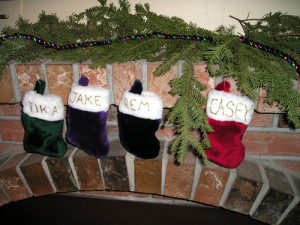Stocaí Nollag Posted by róislín on Dec 6, 2011 in Irish Language
Stoca. Plural: stocaí [STOK-ee] Now there’s a nice, fairly straightforward word in Irish! Sock, socks. Or “stocking, stockings.” The translation depends somewhat on context, of course.
Good news? The words “stoca” and “stocaí” cannot be lenited, or eclipsed, or otherwise “initially mutated” because of the consonant cluster “st,” which never changes. Even in the genitive case (dath an stoca, the color of the stocking)! And even in direct address, should that arise (“Ó, a stoca, maith dom an biorán seo a chuir mé tríot – caithfidh mé thú a chrochadh ar an matal go bhfeicfidh Daidí na Nollag thú!”; aistriúchán thíos).
Christmas stockings? Just take the regular word for Christmas (Nollaig) and change it to “Nollag” for the possessive form. Here we’re using the idea of possession fairly loosely – it’s really more a matter of description. In fact, of “attribution.” So there’s another good steady Irish language rule: attributive nouns, that is nouns used as adjectives, are in the genitive case. Remember “hata fir” (a man’s hat)? Or “cóta mná” (a woman’s coat)? More genitive case there, but we’ll get back to all that tuiseal ginideach stuff another day.
The word ”Nollaig” is fairly unique in how it forms its genitive case. The letter “i” is dropped. A few other words do this, including some place names, like “Ulaidh” which becomes “Uladh” (Cúige Uladh) and “Mumhain” (An Mhumhain), which becomes “Mumhan” (Craobh na Mumhan, the Munster Championship).
And what about “socks” as opposed to “stockings”? Well, mostly “stocaí” is also used, though one could say “stocaí gearra” (lit. short socks) if it was really important to clarify. But could they be mistaken for ankle socks? Ah, no, that’s right, they’d be “stocaí rúitín.” “Bobby sox,” since they’re such an American concept, together with sciortaí púdail, remain as “bobby sox,” even in Irish. And of course, there are the teams, “na Stocaí Dearga” and “na Stocaí Bána” (originally the “White Stockings,” as I understand it)!
And what about stockings, as in nylons and such? One could use “osán” (pl: osáin), but I can’t say I’ve encountered it all that often. “Osán” can also mean “leg of a pair of trousers,” so that could spell semantic trouble!
Curious, come to think of it – in English we could be walking in our “stockinged feet” even if we’re wearing socks, not stockings. Moot point in Irish though – it’s “inár stocaí,” no matter which way you choose to translate it.
Pé scéal é, cúpla ceist fúthu. What are the stocaí Nollag made of? As feilt? As olann (cniotáilte)? Ábhar eile?
An stocaí don Nollaig féin iad? Watch that “an” there – it’s the “an” to ask a question, not the “an” that means “the”! Are they stockings just for Christmas? In other words, are they ollmhór [oll-wor], that is rómhór [roh-wor] le caitheamh? Nó an gnáthstocaí [GNAW-STOK-ee, pronouncing the “g”] iad mar a bhíonn ort i rith na bliana?
And a couple of final “sock” caveats. You may also encounter “soc” but that’s (1) the “sock” (or share) of a plough, and (2) it also means “muzzle,” as some of you may recall (Tusa, a Áine?). And (3) it can also mean “snout,” as in “crogall soc-chaol Afracach” (African slender-snouted crocodile) – now there’s an ábhar cainte for you, the relative width of crocodile snouts, compared perhaps to those of ailigéadair or mogair (crogaill chorraigh). And (4) it also can mean a “nose,” though that’s normally “srón” or “gaosán,” at least for people. But in aviation, we have “soc ar insí” (hinged nose). Literally it’s “nose on hinges,” which I mention here to distinguish it from any stray noses, snouts, muzzles, or nozzles that might be lurking in insí, which, as a completely separate word, means “holms” or “water-meadows” (aka “inches” in Irish English). And normally, of course, noses and the like don’t go “ar strae,” but then, I did see “Sleeper.” For that matter, “insí” also means “islands” (plural of the noun “inis”). Mh’anam!
And the second main caveat: “wind socks” aren’t considered to be “socks” in Irish, but rather “cochaill,” (hoods, cowls, or hooded garments), as in “cochall gaoithe” (wind sock, lit. hood of wind). Logical, really. I’ve never seen anyone try to wear a wind sock on their foot! Well, nor on their head, for that matter!
So, we started with a nice innocent bit of commentary on Christmas stockings and ended up with a terminology round-up fit for those in the field of góiséireacht or osánacht. Ach ná bí buartha, one doesn’t have to be a “góiséir gairmiúil” to hang up a Christmas stocking. It’s, errrm, I won’t say “as easy as pie,” but, ahhh, a piece o’ cake (unless Santa got it first for his sneaic mheán oíche!). SGF, Róislín
Aistriúchán (with “stocking” in direct address): O stocking, please forgive this pin I put through you — I have to hang you on the mantel so Santa Claus will see you.
Gluais: buartha, worried; gairmiúil, professional; matal, mantelpiece; meán oíche, midnight; mogar, mugger (Crocodylus palustris)

Build vocabulary, practice pronunciation, and more with Transparent Language Online. Available anytime, anywhere, on any device.





Comments:
Mise Áine:
Hmmm… an Clásal Coibhneasta sin..;-)
Nollaig Shona, a Róislín!
róislín:
‘Sea, an clásailín coibhneasta deas dílis, ceann d’ábhair ghramadach na Gaeilge is fearr liom!
Go deas cluinstin uait, a Áine, agus Nollaig Shona duitse!